Several years ago, I did a bike ride across Iowa with my mom, dad and one of my cousins. My dad, cousin and I were born in Iowa, so there were plenty of relatives to visit during this weeklong bike ride.
One evening we had dinner at my dad’s cousin’s home and farm. The simple dinner was such a memorable experience—corn-on-the-cob, lettuce and tomatoes that had just been picked from their garden, and hamburgers made from their cattle. Of course everything tasted amazing and was incredibly fresh, but the other piece that was most memorable for me, was that the husks from the corn and all food scraps from the meal were fed to their animals when we were finished eating. It was inspirational to see a full circle of food.

At that time, I was living in California and had a worm composting bin in my backyard that I was having mild success keeping up. I was able to put my raw food scraps, coffee grounds, tea leaves and newspapers into this bin. I had no idea then that so much more was possible.
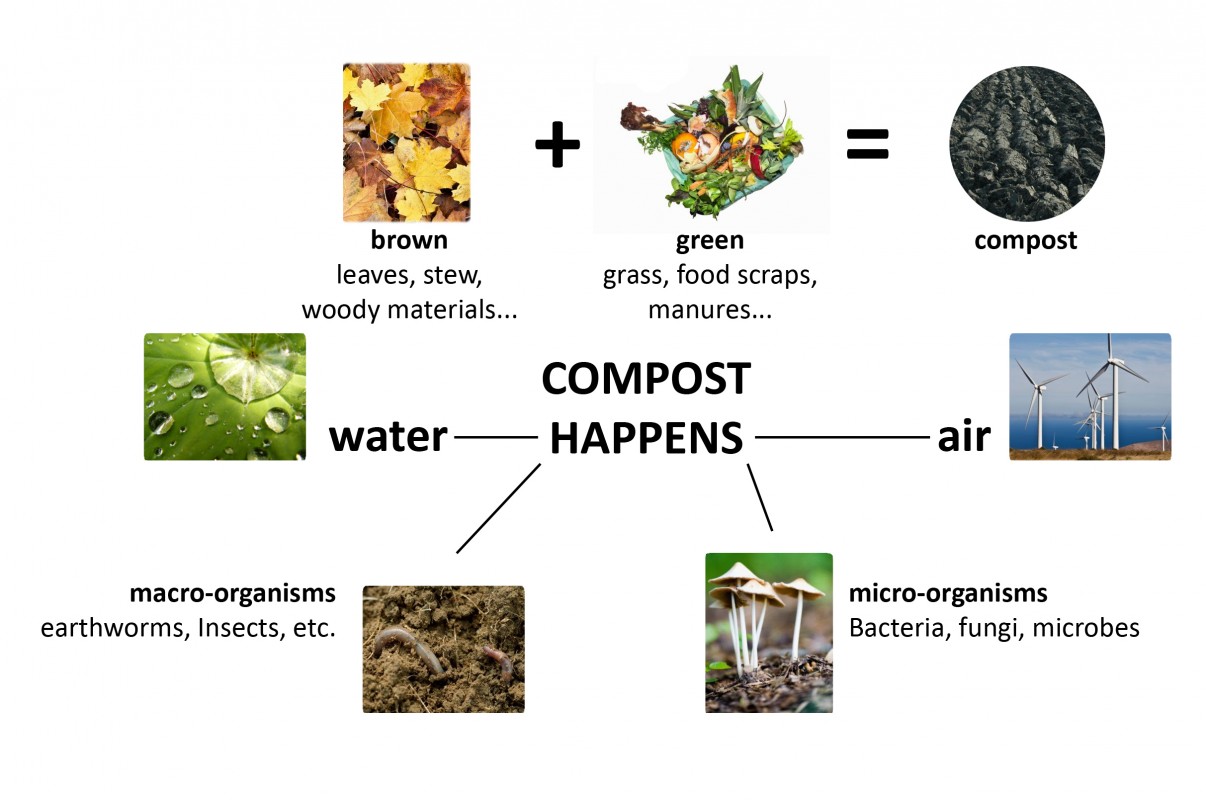
My promise with this website is to make things easy for busy people to implement. My experience is that composting can be complicated and it can also be straight forward. My hope is that this blog makes the habit of composting straight forward for you.
Composting food scraps and other organic waste improves the health of soil, helps keeps moisture in soil, reduces greenhouse gases being released into our environment, and reduces the amount of waste being dumped into landfills.
As mentioned last month, one goal to strive for is reducing food waste. Ideally less food is needed for composting. The reality is that much more than food scraps can be composted under the right circumstances. Less trash goes to landfill.
Some Ways to Compost:
- Tumbler in backyard
- Large bins in backyard
- Vermicompost (worms) bins
- Countertop composters (Lumi and Vitamix Foodcycler, to name two)
- Weekly service
- Curbside options
- Drop-off/empty bins at convenient locations
Tumblers, Bins, Worms, Countertop Machines, Oh My!
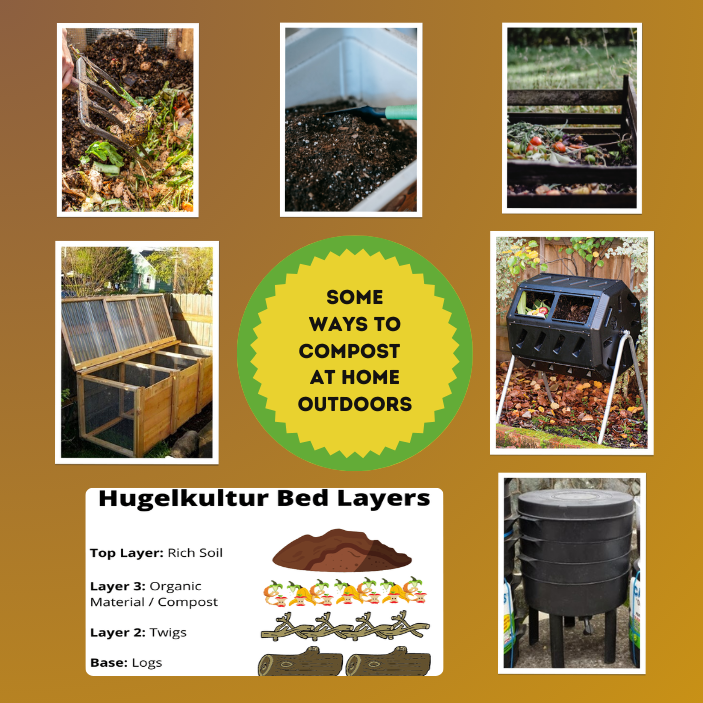
Many people hear the word “compost” and picture a bin (or more) in the backyard. These bins usually need weekly care and seem overwhelming to me.
I used vermicomposting (worms) for many years with a small amount of success, but it wasn’t easy. Lots of people use all these outdoor composting methods with great success, but I wanted simpler.
In recent years, companies have developed electric countertop “composters” (mainly Lomi and Vitamix Foodcycler) that accept food scraps, run overnight and produce a dehydrated version of food scraps. According to BioCycle1, it is important to note that this dehydrated version of food scraps is not considered compost, yet. What these machines do well is reduce the amount of space food scraps take up, since water is a large component of food. Again, I wanted simple.
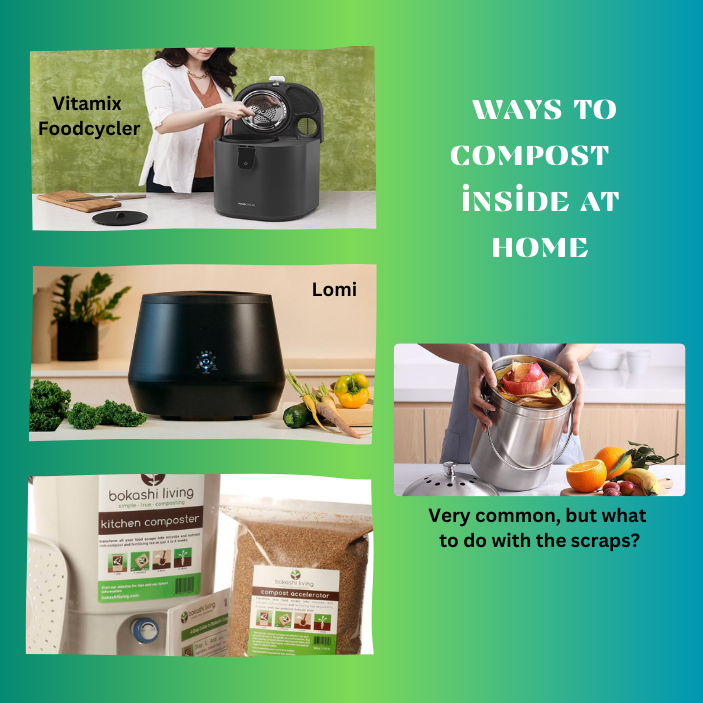
Composting Services
Some people are fortunate to have their municipal waste company include compost pick ups, often with the yard clippings. Where I live, I don’t even have a yard clipping bin, let alone compost pick-up. So I have chosen to pay for this amazing service.
Having a reliable, effective composting system can be a game changer! I currently pay a company called Compost Colorado to pick up my compostable materials weekly. In the spring I receive a dividend of soil amendment made from composted matter that I put into my garden. Because of this service and another recycling service that I’ll talk about in a future blog, I could easily go for 3 months without putting out my garbage bin.
My service allows me to include ALL food waste. This means bones, meat, fat, leftover meal scraps, coffee grounds, tea leaves, tea bags (without staple), raw food scraps, egg shells, newspaper, etc. Since it is a commercial composting system (a process involving high temperatures and pH monitoring), I can put tissues (without lotion), paper towels, cat fur, and BPI certified compostable dishes from takeout, compostable wipes, pizza boxes, and wax paper. I no longer use a paper shredder for sensitive documents. I tear them up into smaller pieces and put into my compost bin!
Whichever form of composting process is used, it is IMPERATIVE to follow guidelines of what can go in the bin so that the resulting dividend is not contaminated. Some of the biggest offenses are the adhesive labels on fruits and vegetables, rubber bands or twisted metal that is used around vegetables and of course, plastics. None of these is compostable and could result in a full compost load going to landfill if the contamination is too much.
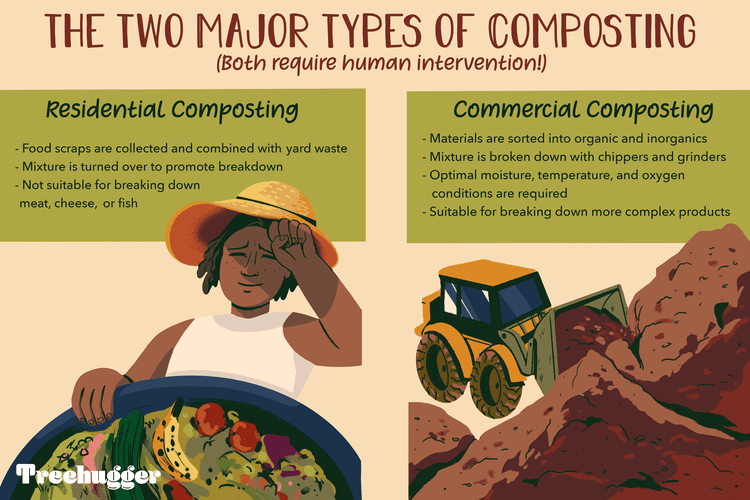
Key Terms to Understand
Compostable vs Biodegradable
Here’s a math analogy:
- All squares are rectangles, but not all rectangles are squares.
- All compostable items are biodegradable, but not all biodegradable items are compostable.
Did you know that a regular plastic bag is biodegradable? It only takes 100s of year to degrade. It is very misleading for us consumers when companies claim something is biodegradable. I used to equate biodegradable with compostable, feeling I was doing something good for the environment by using that product. There is actually a name for this marketing practice–greenwashing (see below).
Only by researching for this blog have I discovered what to look for when purchasing compostable products. I will share some of the products I found at the bottom of this blog. I was unaware of how complicated some companies have made it for consumers to do the right thing.
Any compostable product means it can biodegrade (break into simpler elements with the help of microorganisms) under specific, human-driven circumstances. Biodegradation is a natural process also called decomposition. Decomposition does not necessarily mean that the item can be made into a good quality compost. Composting requires human involvement to speed up the process of decomposition. This human involvement means monitoring temperature and pH levels, as well as making sure the correct amounts of water, oxygen and organic matter are mixed together.
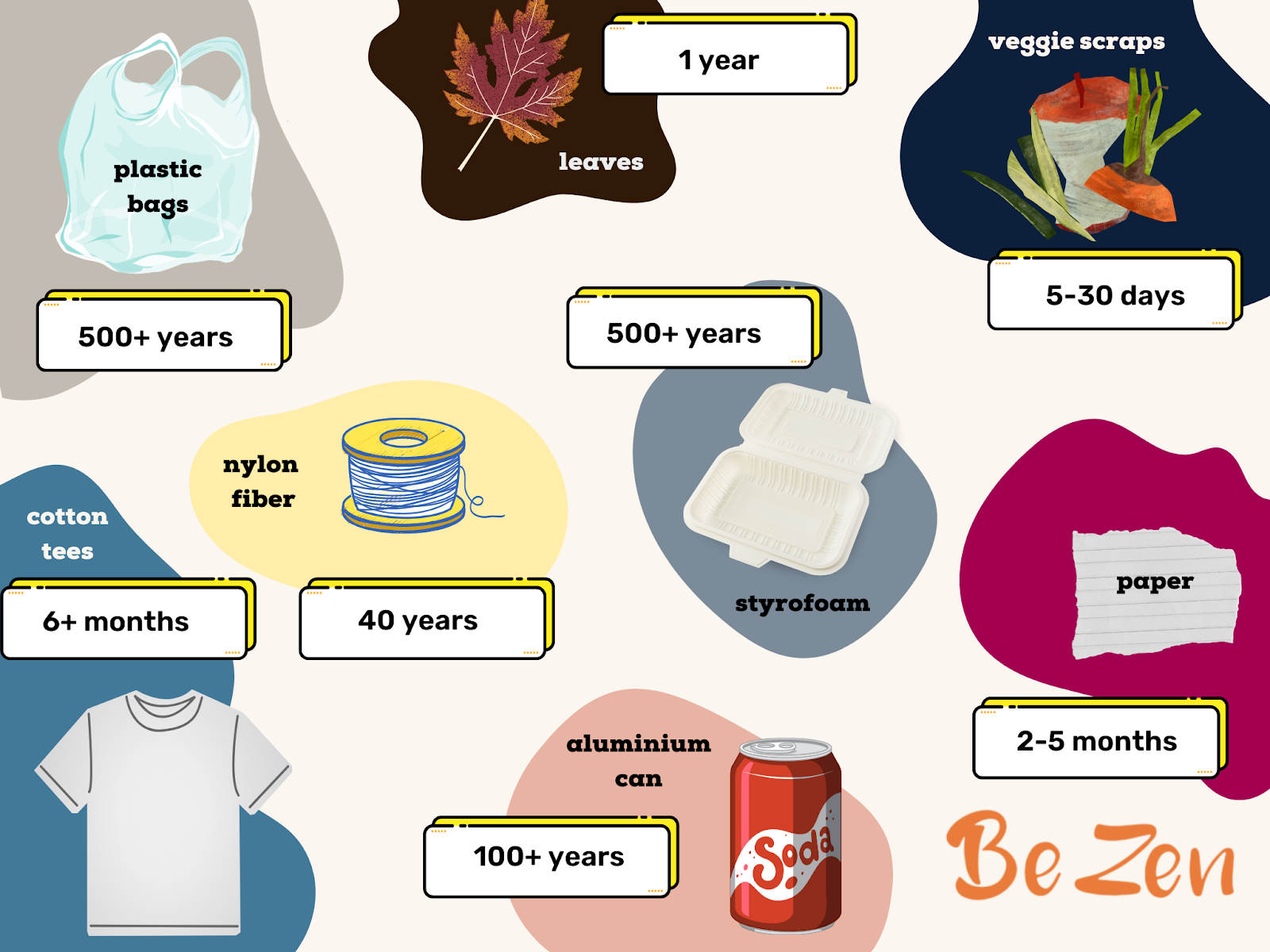
Time Taken For Biodegradation, information sourced from Treehugger
Compost Contamination
As mentioned above, it is critical to follow the composting guidelines put out by your provider. Metro Denver now has compost pick-up for its residents. Recently, due to very bad contamination issues, Denver residents have had to restrict compost collection only to yard and food wastes. No paper products or other common compost items. When compost collections become contaminated, they have to be dumped into landfill, which defeats the whole purpose of reducing garbage.
Check with your service, but here are some general guidelines for commercial composting systems:
- No fruit and vegetable labels
- No rubberbands or twist ties
- No takeout containers unless specifically marked “BPI certified”
- No coffee cups
- No latex gloves (happens a lot when a restaurant is collecting compost)
Greenwashing
According to Merriam-Webster dictionary, the definition of greenwashing is “the act or practice of making a product, policy, activity, etc. appear to be more environmentally friendly or less environmentally damaging than it really is.” This term was first used in 1990, but I had never heard of it until I started this website.
Interestingly, I was recently given two brands of “compostable” bags from friends to use. Last month I tried each of them. The “Think Green” bags didn’t feel as soft and silky as the other, but the packaging said “compostable” and “Made from Plant Based starches (Corn) materials.” So it seemed legit. Then I started reading about greenwashing and how to spot it and realized this product doesn’t have the certification to back up its claims. An employee at a composting company told me that compostable bags almost always state that feature on each bag to eliminate confusion. It is so frustrating that we, the consumer, are being deceived like this.
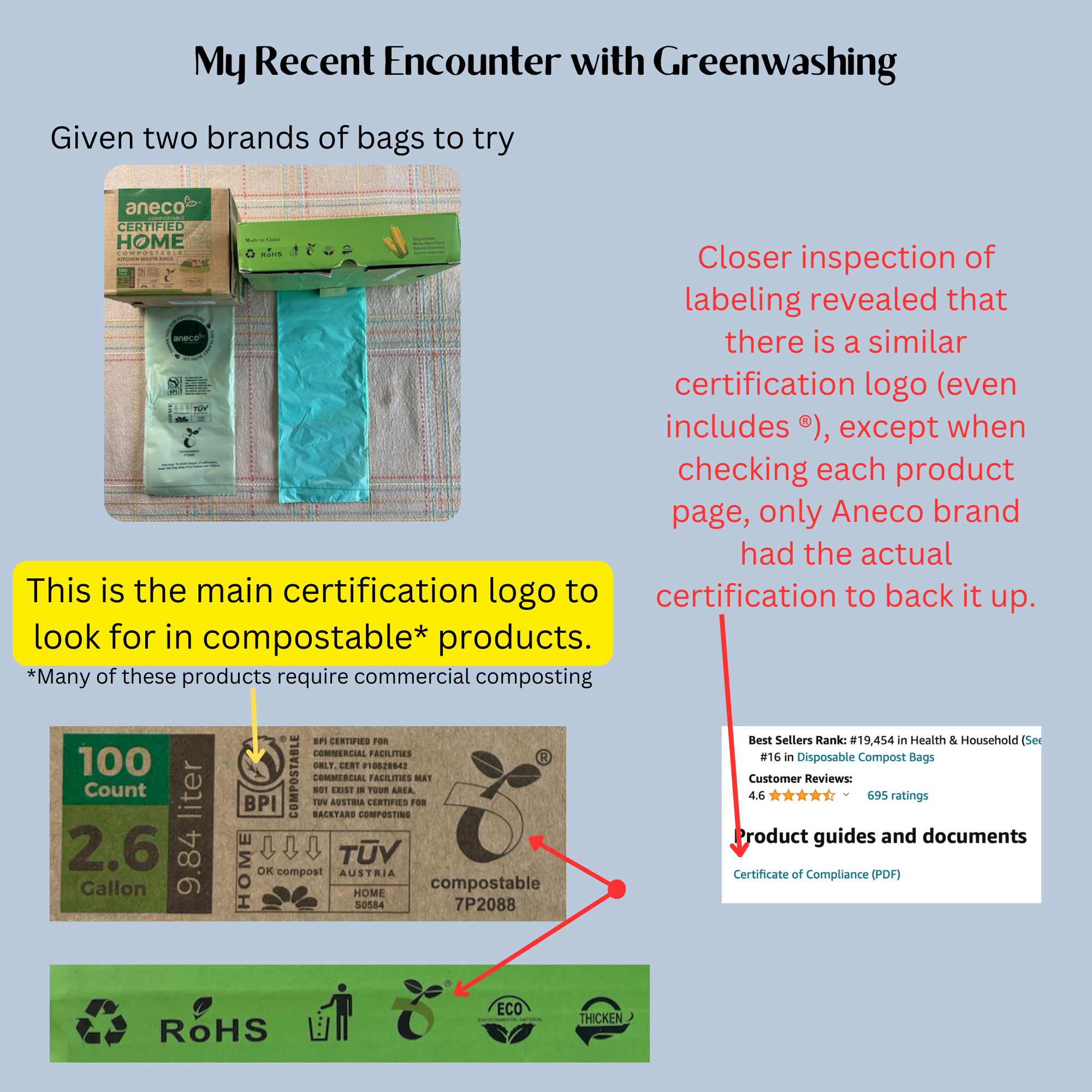
Next steps
Certifications for compostable products come from three main certifying organizations: TUV Austria, BPI (Biodegradable Products Institute) and CMA (Compost Manufacturing Alliance). Look for their logos!
If you have a composting system in place, confirm which items can be composted so contamination doesn’t occur on your end.
If you are looking for a composting service, click this link to find services by state.
If you live in Denver proper and have questions about recent changes in composting, this link will take you to their FAQ page.
If you’d like to learn more about composting, my friend and fellow blogger/podcaster Katie Kurpanek with That Minimal Life offers coaching and video courses. If you use the code “BARBARA” when you check out, you’ll get 10% off!
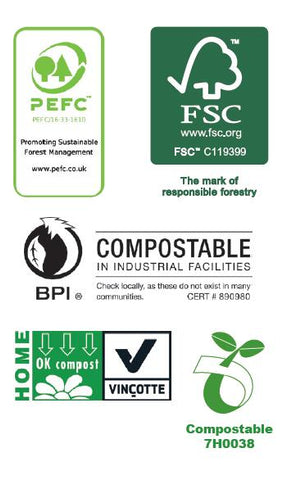
Lastly, if you’d like more information about the commercial composting process this 7 minute video does a good job of showing it.
1BioCycle,
Compostable Products to Consider
I found the products below through online research. If the product has * I have used it personally. Products with a B represent companies that have earned a Certified B Corporation seal. I will be discussing this certification in next month’s blog about “shopping your values.”
In the interest of full disclosure, I may receive a small commission if purchases are made from affiliate links. This supports work at Earth Matters Now at no extra cost to you. Thank you for considering it.
Coffee pods (storage bag also compostable)
When using loose leaf teas
-
-
-
-
- Jarware tea infuser for regular mouth mason jar
- Jarware infuser for wide mouth mason jar (includes 64 oz jar)
- Tiesta Tea infuser basket
- Snail garden compostable tea bags
-
-
-
Hand/Face Wipes
Cleaning wipes
Countertop Compost Bin
Bags for compost canister (2.6-3 gallon)
Dryer sheets
-
- *Seventh GenerationB
- *Grab Green (says you can reuse, but I didn’t think they were as good 2nd time)
- Cleanomatic Earthfresh
- Mrs. Meyers
Tea bags: 20-30% of tea bags on the market are made of polypropylene which isn’t compostable. The teas below are compostable.
-
- *Celestial Seasonings
- *PG Tips
- *Clipper B
- *Traditional Medicinals B (wrappers are BPI-certified compostable)
- *Yogi tea B (All Yogi tea bag components are compostable except the staples used to seal the bag and attach tag on some of their teas.)
- *Stash B
- *Numi B (wrappers also compostable)
- *The Republic of Tea
- *Bigelow B
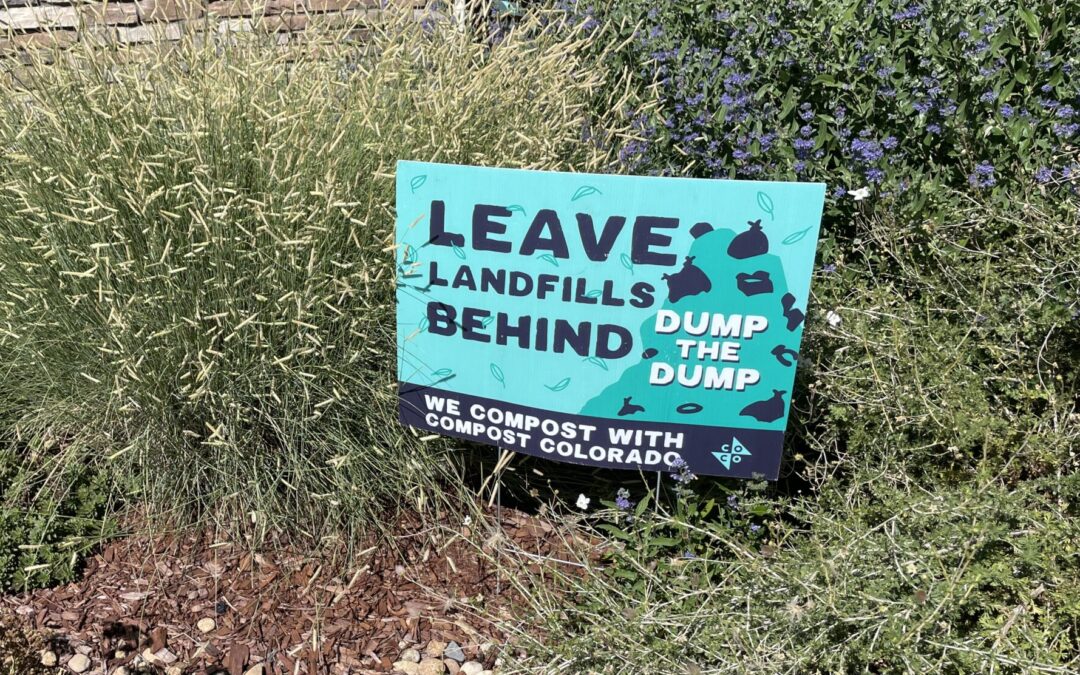
At one time we had two large backyard bins in which we put fall leaves (saved to use throughout the year), grass cuttings, food scraps, and a layer of dirt. We covered it all tightly with plastic to contain the heat it created and
It turned into wonderful brown compost over time.
I have never thought about the difference between biodegradable and compostable. Thank you for the enlightening information.
You are welcome!